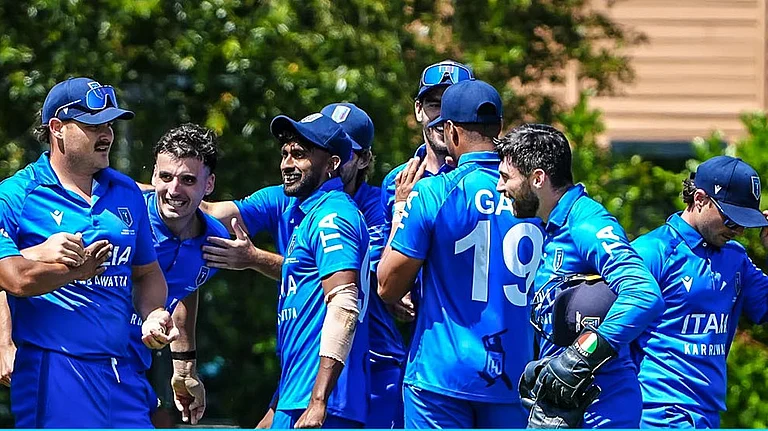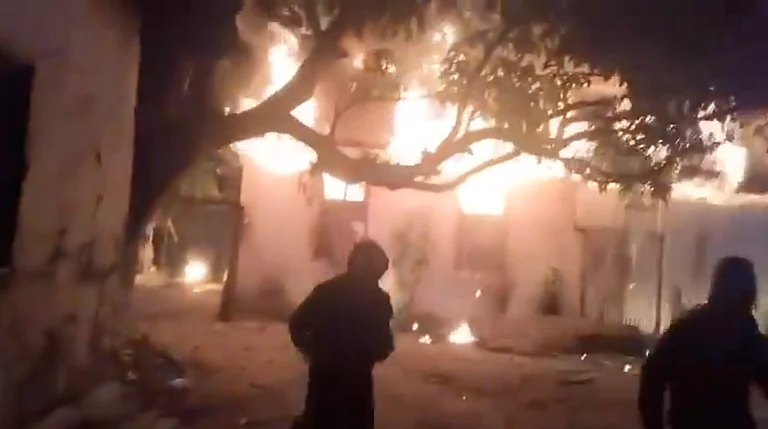Five weeks after the start of an undeclared war, there's still a curious unwillingness in New Delhi to face the full implications of what Pakistan has done in Kargil. Not only did it keep silent during the days in May when it knew that Pakistan had invaded India and Indian patrols were disappearing eight and 10 kilometres inside Indian Kashmir, but till today prime minister Atal Behari Vajpayee refers to Kargil as a 'war-like situation' and not a war. A foreign office spokesman describes Pakistan's action as 'a kind of invasion'. Most official communiques describe Pakistan's action as an 'intrusion'. And when queried about the possibility of a wider war, the external affairs spokesman forgets that while it takes only one to make war, and speaking inadvertently for Pakistan, declares that this is 'out of the question'.
There is a wishful thinking behind all this that brands the Indian state and its elite as self-indulgent cowards. 'Let us give Pakistan an escape hatch,' its thinking goes. 'If only we don't call it an invasion, Pakistan might still decide to withdraw.' Such cowardice is multiplying the danger that India will face in the coming weeks. It is therefore time for us to face some grim facts.
First, contrary to what papers publish daily, India isn't winning the war in Kargil. The most the army may be doing is making slow progress at a huge cost in lives. This is because air attacks are of very limited use in a terrain where a miss by a couple of feet can make a bomb fall 5,000 feet below the target and where helicopters are sitting ducks. Only infantry can recapture the ridges. And thanks to a gross,indeed unprecedented,dereliction of duty and disregard of standard operating procedures by the Indian army, Pakistan has already taken the ridges. One machine gun dominating a ridge can make all advance along it impossible.
Sartaj Aziz is therefore coming with the sole purpose of giving India (not Pakistan) an opportunity to save face. In exchange by merely getting India to discuss the existing position on the ridges, he is seeking to give the new de facto line of control in Kargil the beginning of a tenuous legality. It goes without saying that Vajpayee would not accept this even if it had not been an election year. But he needs to do more and divine what Pakistan's game may be.
To anyone who has not been lulled by the fact that Nawaz Sharif and most of the Pakistani army generals speak Punjabi, the gameplan is obvious: it is to ethnically cleanse Doda and the north-western part of Jammu district of Hindus, and Kargil of the fanatically anti-Pakistan Shias; create a new 120 km front through which Afghans and Pakistani irregulars can infiltrate into northern Kashmir and turn the valley into another Afghanistan. At a critical moment the artillery, directed by its men atop the Dras and Batalik heights, will cut the road to Leh and the mercenaries in Jammu will cut the road from India not at the notorious chicken's neck but in the hills near Ramban.
Large parts of this plan are already in place. In September '97, Pakistan moved long-range guns into Baltistan and began to bombard Kargil and adjoining villages. Last year, they cut the road to Leh in three places for weeks at a time. This year, spotters on the heights above Dras and Kargil have directed artillery fire that has completely closed the Leh road, and forced the evacuation of not only Kargil and Kaksar but also much of Dras.
Between July and October '98, Pakistan infiltrated over a thousand mercenaries into the Valley and Doda, taking their number up to more than 2,000. Their numbers have no doubt gone up further this summer. With the Taliban's victory in Afghanistan, the isi has an inexhaustible supply of Islamic fanatics. In addition, Pakistan has to find an occupation for the estimated half-million Islamic zealots being trained in its Din-i-Madaris. In the next year or two, it's likely to infiltrate the most committed of them not into Kashmir but the rest of India to create mayhem, disperse the security forces, distract the government and soften Kashmir further.
With a disregard for the future that Louis XVI of France might have envied, Indian analysts regally dismissed all information they did not like. Thus, in October and November, when Srinagar was full of whispers that the Taliban were coming, Indian analysts ignored them. After all that has happened in the past month, they would be well advised not to ignore the scenario I've constructed here and judge Pakistan's planners by their own yardstick. India is a timid, risk-averse country. From the very first months of its existence, Pakistan has been just the opposite. From invading Kashmir in '47, to occupying the Rann of Kutch and sending infiltrators to Kashmir in '65, to stealing nuclear secrets from every western country in the '70s and '80s, to promoting terrorism in Punjab and insurgency in Kashmir, and finally to launching a cold-blooded and successful invasion of Kargil when it does not have two pennies to rub together, Pakistan has lived on the razor's edge of risk. It has got away with it only because India has not been able to match its courage and call its bluff.
It has done all this with only one goal in view,to wrest Kashmir from India. It will not ever give up that attempt. The question of wheedling Pakistan into accepting the LoC as the border does not then arise. From Pakistan's point of view, this would be suicide. It was formed as a home for the subcontinent's Muslims, but India destroyed that illusion when it helped Bangladesh to secede. If it accepts the status quo in Kashmir now, every shred of its raison d'etre will vanish and Pakistan will sink into the hell of a failed State. Kashmir is the only thread that keeps it together. If India manages to oust Pakistan from Kargil, something much, much worse could follow. Vajpayee needs to guess what that could be and take the necessary precautions now.























